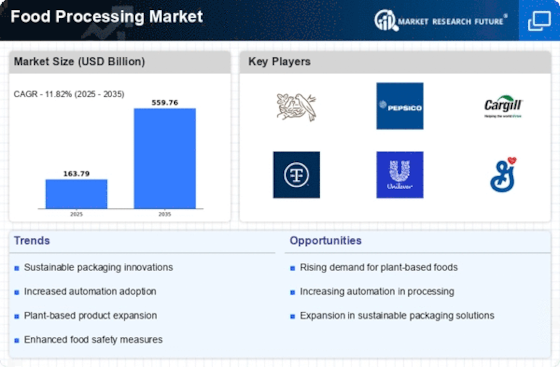Top Industry Leaders in the Food Processing Market

Strategies Adopted by Food Processing Key Players
The Food Processing market is a dynamic sector that plays a pivotal role in the global food industry. This analysis provides insights into the competitive dynamics of the market, covering key players, adopted strategies, market share factors, industry news, emerging companies, current investment trends, and a significant development in 2023.
Key Players:
Marel
GEA Group AG
The Bühler Holding AG
JBT Corporation
Alfa Laval AB
TNA Solution Pty Ltd
Bucher Industries AG
Clextral S.A.S
SPX Flow
Bigtem Makine A.S.
FENCO Food Machinery s.r.l.
Krones AG
Paul Mueller Company
The Food Processing market employ various strategies to stay competitive and adapt to evolving consumer preferences. Vertical integration is a common approach, with companies like Tyson Foods engaging in the entire supply chain, from sourcing raw materials to processing and distribution.
Product diversification is another key strategy, where companies expand their product lines to cater to a broad consumer base. Nestle, for instance, continuously introduces new products and acquires innovative brands to ensure a comprehensive portfolio that aligns with changing market trends.
Market Share Analysis:
The Food Processing sector is influenced by factors such as product quality, distribution efficiency, brand reputation, and compliance with food safety standards. Companies that consistently produce high-quality and safe food products tend to gain and maintain significant market share.
Distribution networks also play a crucial role, with companies leveraging efficient supply chains to ensure their products reach consumers promptly. Strong brand recognition and consumer trust contribute to market share, as customers often opt for familiar brands when making food purchasing decisions.
News & Emerging Companies:
The Food Processing market is characterized by continuous innovation and the emergence of new companies introducing novel processing techniques and products. Start-ups like Beyond Meat and Impossible Foods have gained attention for their innovative plant-based meat alternatives, disrupting traditional meat processing norms.
News in the industry often revolves around advancements in food processing technology, sustainable practices, and strategic partnerships. Collaborations between traditional food processors and technology companies are becoming more common, leading to the development of smart manufacturing solutions that enhance efficiency and quality.
Industry Trends:
The Food Processing market underscore a commitment to sustainability, technological advancements, and the pursuit of healthier food options. Investments in sustainable sourcing practices, energy-efficient processing methods, and eco-friendly packaging solutions are prevalent across the industry.
Technology-driven investments focus on automation and data analytics to streamline production processes and enhance overall efficiency. Companies are increasingly incorporating artificial intelligence and machine learning into their operations to optimize production, reduce waste, and improve the overall quality of processed foods.
Investments in health and wellness-oriented products reflect the growing consumer demand for healthier food choices. This trend is evident in the development of functional foods, fortified with vitamins, minerals, and other beneficial ingredients, as companies aim to cater to health-conscious consumers.
Competitive Scenario:
The Food Processing market exhibits a highly competitive landscape where large multinational corporations compete with regional players and innovative start-ups. Established companies leverage their global reach and financial resources to invest in research and development, ensuring continuous innovation in food processing techniques.
Emerging companies contribute to the competitive scenario by introducing disruptive technologies and sustainable practices that resonate with contemporary consumer values. The overall competitive landscape is shaped by a balance between industry giants and agile innovators, creating a dynamic environment that fosters growth and adaptation.
Recent Development
The Food Processing market was Nestle's acquisition of a leading plant-based food company. This strategic move marked Nestle's commitment to expanding its plant-based product offerings, aligning with the rising consumer demand for sustainable and plant-derived alternatives.
The acquisition showcased Nestle's adaptability to market trends, recognizing the growing popularity of plant-based diets. This development not only expanded Nestle's product portfolio but also indicated a broader industry shift towards plant-based and sustainable food processing practices.











